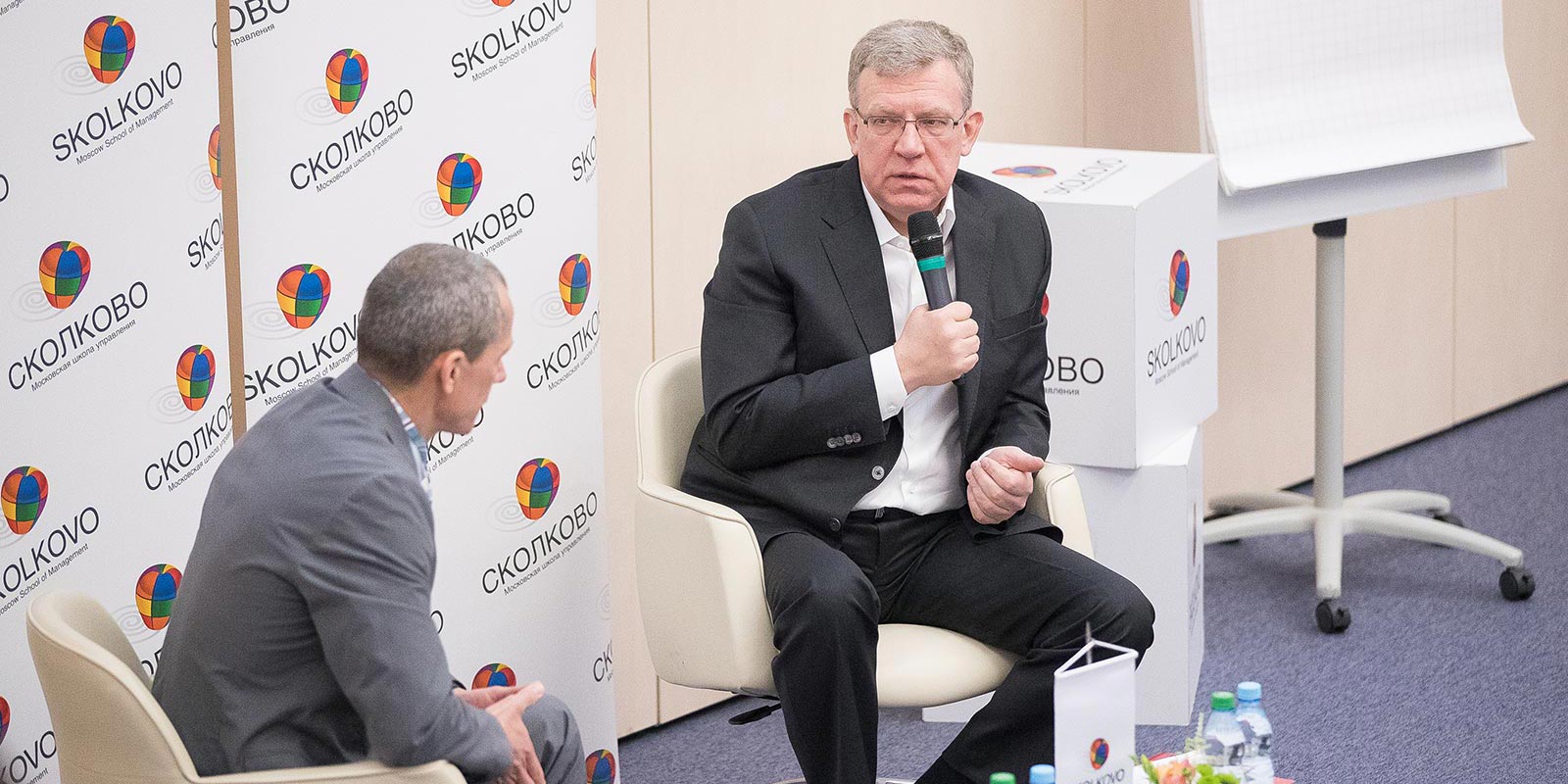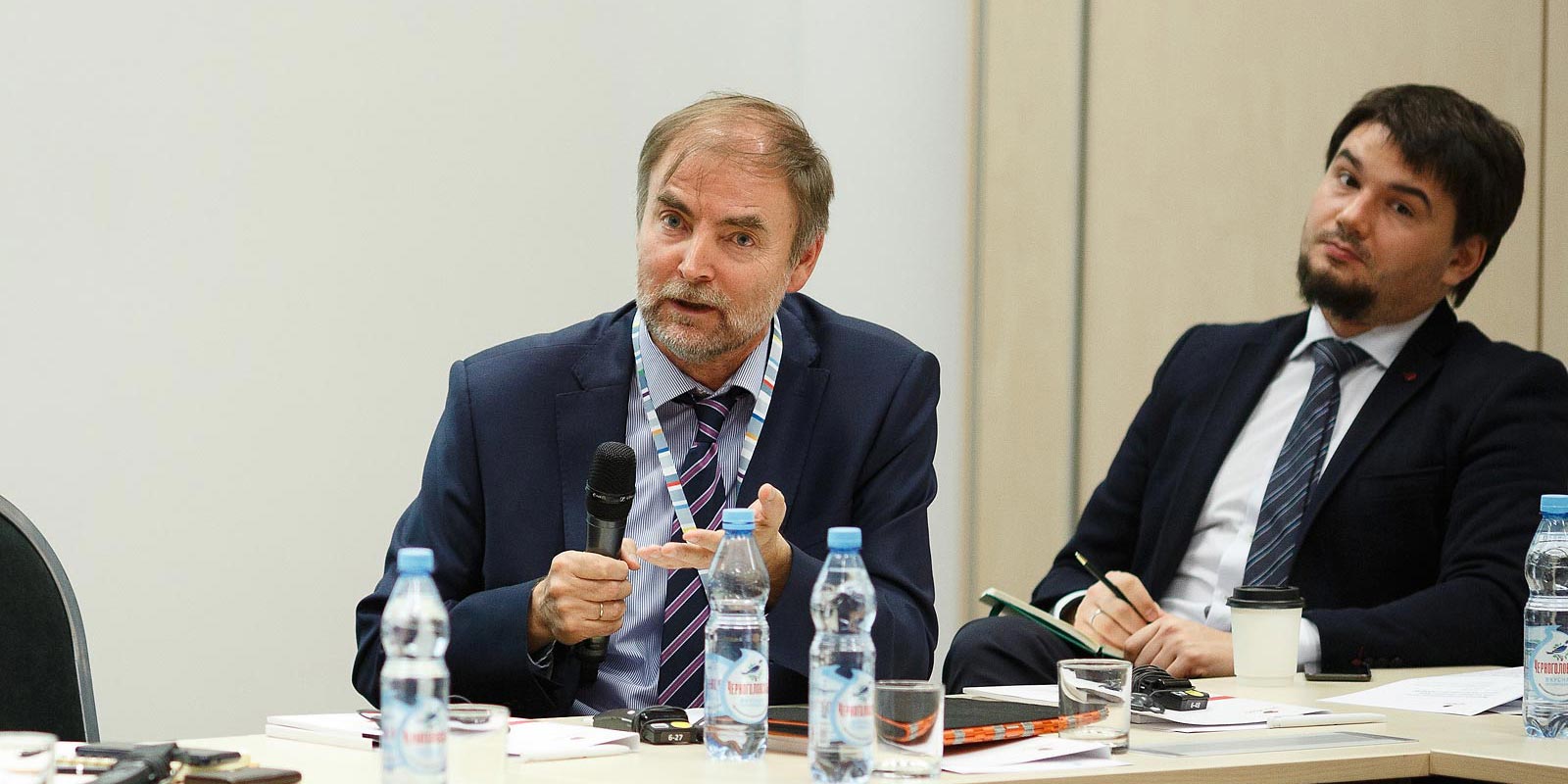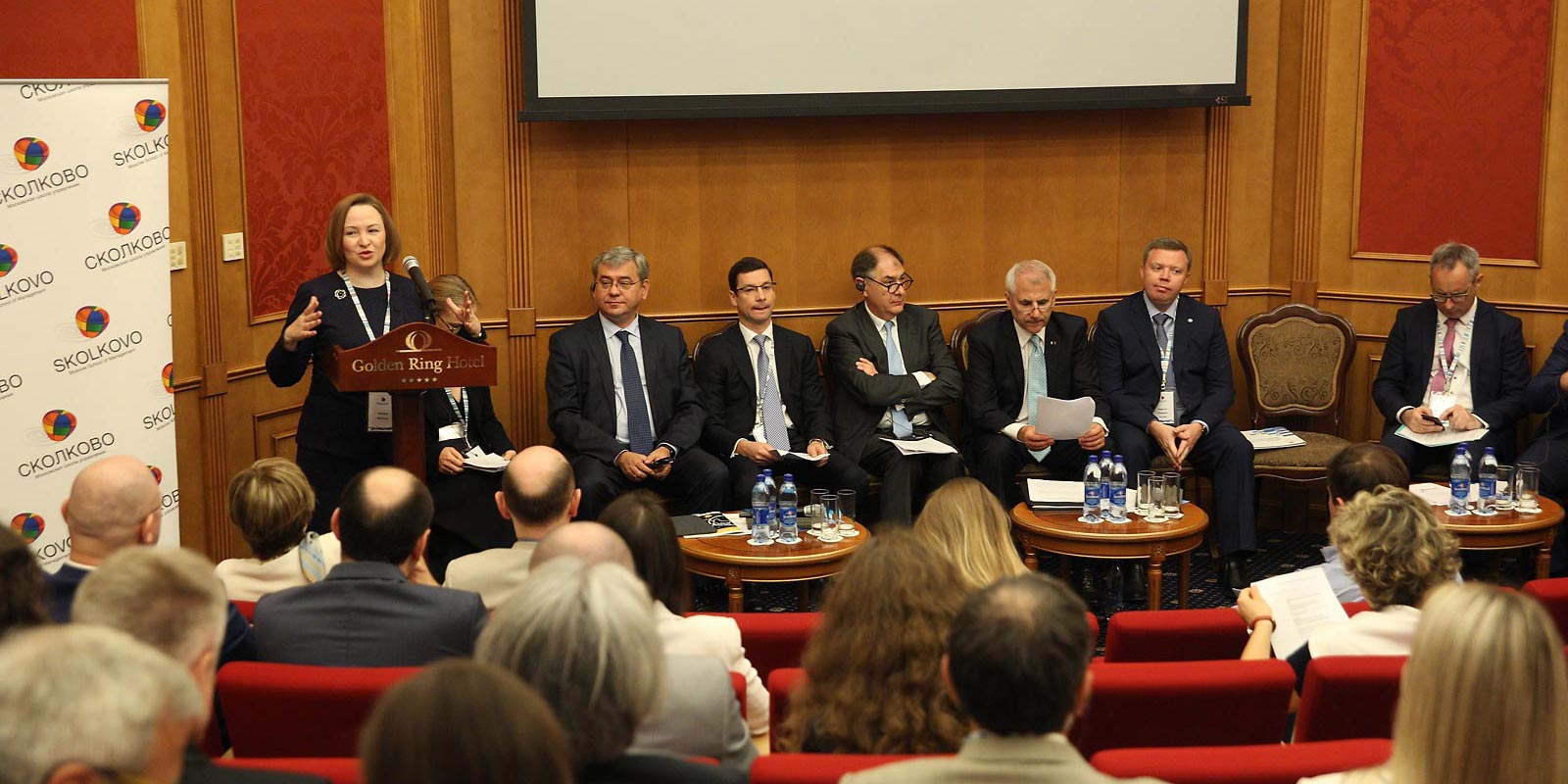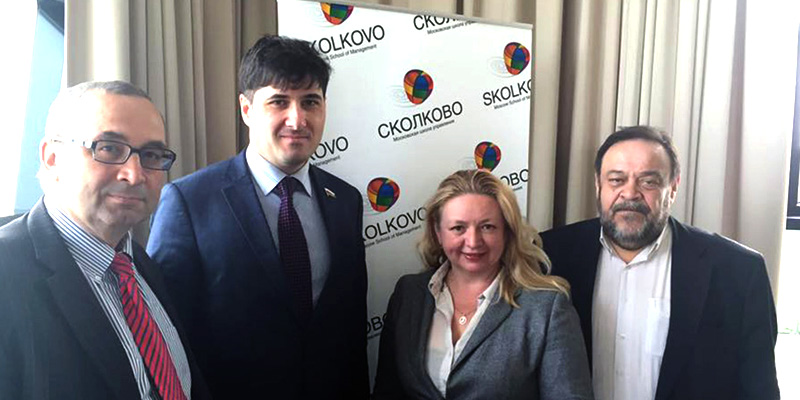
Energy dialogues
We believe that it is only through dialog that it is possible to find answers to the most difficult challenges facing the Russian fuel and energy sector. Therefore, one of the most important areas of our work is the organization of multilateral industry dialogues between Russian and foreign energy companies, authorities and the expert community with the aim of promoting the efficient development of fuel and energy industries.
The SKOLKOVO Energy Center is an ideal platform for conducting informal international dialogues and meetings between experts. We have created a unique set-up for regular interaction between power companies, experts and government authorities to discuss the strategic outlook for the sector's development: the SKOLKOVO Energy Club. The Energy Club Dialogues cover the following areas: Oil, Gas, Arctic and New Energy. By dividing the dialogues into these topics, we are able to amass together the stakeholders who are the most relevant to each particular area and have in-depth discussions on various aspects of energy development. The meetings are usually held "behind closed doors", and discussions are carried out under the Chatham House Rule, which is common practice for leading global expert discussion panels (participants can report on information disclosed during a meeting, but the source of the information must not be explicitly of implicitly identified). This encourages highly efficient communication during discussions of fundamentally important issues for the industry.
Oil Dialogue


SKOLKOVO Energy Club holds First Oil Dialogue
The SKOLKOVO Energy Center has set up a new format for regular interaction between energy companies, experts and the authorities to discuss the strategic development prospects of the sector – the SKOLKOVO Energy Club, which will host dialogs on areas such as Oil, Gas and New Energy. On May 14-15, the Oil Dialogue kicked off with the foresight session "Russia’s Oil Industry in 2030 – Outlook and Scenarios of Development". The main objective was to gather together government representatives, business heads and leading experts on an independent platform to informally discuss ways of the oil industry development until 2030. The format of the foresight session encouraged a free and constructive dialogue between all the parties interested in efficiently developing the domestic oil industry.
Speakers at the general sessions included Andrei Sharonov, the President of the Moscow School of Management SKOLKOVO; Alexey Kudrin, the Chairman of the Council of the Center for Strategic Research; Bassam Fattouh, the Director of the Oil Programme at the Oxford Institute of Energy Studies and Michael Wade, Professor of Innovation and Strategy at IMD and Cisco Chair in Digital Business Transformation.
-
more_horizRead more
The program was made up of general sessions as well as work in project groups. Among the topics under discussion were global trends, challenges and threats requiring a collaborative solution in the near future and other issues of importance for the industry. In total, over 50 guests, including representatives of government bodies, the corporate sector and expert organizations, took part in the foresight session. The session was carried out under the Chatham House Rule, which is common practice at global conferences attended by leading experts. The Rule means that participants can say the event took place and mention who attended, but they may not publicly disclose information concerning the statements of other participants. This set-up encourages highly efficient communication during discussions of fundamentally important issues for the industry.
The results of the two days were presented at the final session, which was attended by representatives of government authorities and leading oil and gas companies: Arkady Dvorkovich, Deputy Prime Minister of the Russian Federation; Alexey Texler, First Deputy Minister of Energy; Kirill Molodtsov, Deputy Minister of Energy; Alexander Dyukov, Chairman of the Board of PJSC Gazprom Neft; Evgeny Tolochek, President of RussNeft; Nail Maganov, CEO of PJSC Tatneft, and Gokhan Saygi, President of Russia & Central Asia at Schlumberger Limited.
“I want to thank all of our guests for finding the opportunity to take part in this dialog. I am sure that the time invested by the participants of the foresight session in the sector-wide discussion was well spent. A ‘frank and open’ learned discussion among professionals and decision-makers on the pressing needs and problems affecting the industry is perhaps one of the most important levers to facilitate the efficient development of Russian energy” – remarked Tatiana Mitrova, Director of the SKOLKOVO Energy Center.
Gas Dialogue


First Gas Dialogue
The SKOLKOVO Energy Club is continuing with its aim to ensure regular interaction between companies operating in the energy sector, government authorities and experts to discuss the strategic prospects for the development of Russian oil, gas and power industries. The Energy Club held a Gas Dialog on July 6. The main objective of the session, entitled "Market Pricing for Gas: The Role of the Gas Exchange Trading" was to outline the international experience in developing exchange trading in gas, and to promote an informal, constructive dialog on the development of the Russian gas market among all stakeholders. Speakers at the event included Andrei Sharonov, President of the Moscow SKOLKOVO School of Management; Tatiana Mitrova, Director of the Energy Center; James Henderson, Director of the Natural Gas Programme at the Oxford Institute for Energy Studies and Patrick Heather, Senior Research Fellow at the Oxford Institute for Energy Studies.
-
more_horizRead more
During the dialog, important issues facing the industry, such as the need to promote market pricing in the Russian gas market, as well as the international experience in developing exchange trading in natural gas and the lessons it can teach Russia, were discussed. The session also covered the challenges and threats facing the market and global trends that require a cross-industry solution. As at the Oil Dialog held in May, everything discussed at the Gas Dialog came under the Chatham House Rule, meaning that information shared by participants could not be publicly disclosed without their consent, thereby encouraging effective communication during the discussion of issues of fundamental importance for the industry.
The final session of the Gas Dialog was attended by representatives of government bodies and leading oil and gas companies, including the Ministry of Economic Development, the Federal Antimonopoly Service of Russia, PJSC NOVATEK and PJSC NK Rosneft.
"We are grateful to all the participants of the Gas Dialog for the time they spent discussing the topical and burning issues facing the gas industry. I am convinced that an open and honest conversation among professionals is one of the most effective ways to develop the Russian energy industry”, said Tatiana Mitrova, director of the SKOLKOVO Energy Center.
Second SKOLKOVO Gas Dialogue
The Energy Club of the SKOLKOVO business school continues its work, aiming to ensure that the companies operating in the fuel and energy sector, government authorities and the expert community have regular informal interaction on strategic issues of the Russian energy sector development.
The second Gas Dialogue was held on the campus of the SKOLKOVO business school on the 18th of October. Its main theme was "Market pricing for gas: the role of gas exchange trading". The main objective of the meeting was to discuss the ways of developing gas pricing in Russia, primarily in the context of gas exchange trade, taking into account foreign experience and specific features of the Russian energy sector.
The guests were welcomed by Andrei Sharonov, President of the Moscow School of Management SKOLKOVO. Tatiana Mitrova, Director of the Energy Centre, spoke about the results and key conclusions of the first dialogue. James Henderson, Director of the Natural Gas Programme at the Oxford Institute for Energy Studies, Patrick Heather, senior fellow at the Oxford Institute for Energy Studies and Zlata Sergeeva, a junior analyst at the Energy Center also made presentations to the participants of the Gas Dialogue.
-
more_horizRead more
Participants discussed not only the current state of gas trading at SPIMEX and the regulators’ further plans for its development, but also the issues of access to the GTS, the introduction of potential reselling of gas and futures for gas deliveries and the attitude of consumers to gas trading. As usual, the discussion was held under the Chatham House rule, which implies non-disclosure of the specific content of the participants' statements without their consent. This makes it possible to create an atmosphere of the most effective communication while debating the issues which are of key importance for the industry.
The second Gas Dialogue was attended by representatives of the state authorities and top oil and gas companies: the State Duma, the Ministry of Economic Development, the Ministry of Energy, the Federal Antimonopoly Service of Russia, NOVATEK PJSC, Gazprom PJSC and the largest gas consumers. "Discussing strategically important and exciting topics in the gas industry in a relaxed atmosphere is becoming a good tradition, which is undoubtedly fruitful and contributes to the effective development of the Russian fuel and energy sector" - summed up the meeting Tatiana Mitrova, Director of the Energy Centre of the SKOLKOVO business school.
New Energy Dialogue


The first EU-Russia Conference “Energy Transition: The New Paradigm” took place with the assistance of the Energy Center.
An international conference entitled Energy Transition: The New Paradigm, was held in Moscow on June 29, organized by the Energy Center of the SKOLKOVO Business School in cooperation with the EU Representative Office in Russia, embassies of the EU countries in Russia (Germany, France, Italy, Belgium, the Netherlands, Spain, Finland), and the Higher School of Economics. The conference was held within the framework of the EU Climate Diplomacy Week, a global initiative of the EU aimed at combatting climate challenges and promoting sustainable development.
The conference had several goals: to highlight global trends in energy transformation and their eventual impact on the Russian fuel and energy complex and on the country's economy; to evaluate the technical potential, costs, and benefits of a diversified energy policy that will pay more attention to the active use of new technologies of renewable energy sources in Russia; and to analyze technological, structural, and regulatory challenges for the energy transition in Russia.
-
more_horizRead more
The event was attended by EU and Russian energy companies, representatives of governmental authorities, as well as by experts from think tanks and non-governmental organizations, and members of the mass media. This event became a platform for open discussion and productive dialogue among the main participants of the energy field of Russia and the EU. The conference was addressed by representatives of Russian governmental bodies (Ministry of Energy, Ministry of Economic Development, Ministry of Natural Resources and Environment, the State Duma Committee on Energy), EU Delegations and EU Embassies in Russia, Russian energy companies, Russian branches of international energy companies (BP, Siemens, GasTerra, ENEL, Rosatom , Windlife, Gazprom Neft, LUKOIL, Shell, etc.), members from research and educational institutions (the Energy Center of the SKOLKOVO Business School, the Analytical Center for the Government of the Russian Federation, the Higher School of Economics, the Energy Delta Institute), and non-governmental organizations (REN21, the Energy Consumers Association, the Russian Association of the Wind Power Industry, Greenpeace, WWF, etc.).
Conference participants discussed a wide range of subjects, such as the activities of the European Union and Russia regarding energy transition and climate; energy transition in the world; private companies' viewpoints on energy transition and climate with an emphasis on the transformation of the energy business towards ecological compatibility; renewable energy sources and the potential of using new technologies in hard-to-reach regions of Russia; and the challenges and possibilities relating to energy transition for Russian energy policy and economic policy.
A press conference for the event was held at which there was a presentation of the 2017 Global Status Report (GSR) on Renewables, the most comprehensive annual overview of the status of renewable energy in the world, published recently by the international agency REN21. In answering questions from journalists, Christine Lins, Executive Secretary of the REN21 agency, noted that a strengthening of cooperation on renewable energy between the EU and Russia would not only help to fight climate problems in the region, but also would help Russia take a leading position in the field of energy transition.
“Energy efficiency is not just a slogan, it is one of the most cost effective ways to support the transition to a low-carbon economy and a crucial policy to help implement the Paris Agreement. To support and accelerate the global transition to a low-emission and climate-resilient future, the EU continuously and relentlessly forges new partnerships around the world. We have accumulated experience in developing and implementing ambitious climate policies and we are ready to share our experiences and lessons learned”, said Vygaudas Ušackas, the EU Ambassador to the Russian Federation.
Alexey Texler, First Deputy Minister of Energy of the Russian Federation, commented in his welcoming remarks: “We are pleased that the cooperation between the EU and Russia on renewable power generation issues is being developed. This is of fundamental importance for energy policy in the 21st century. Strategy for the development of renewable energy sources should serve as the basis for the power industry of the future. The dialogue between Russia and the EU already forms the foundation for the transformation of the global power generating industry”.
The Energy Center of the SKOLKOVO Business School was not only the organizer of the conference but was also a key participant. Tatiana Mitrova, Director of the Energy Center, moderated two sessions. Romas Samsonov, Head of the Gas and Arctic Section, and Alexey Khokhlov, Head of the Power Engineering Section, both participated actively in the roundtables and panel discussions.
“The challenges for world energy can be overcome only through the joint actions of all stakeholders who are interested in the stable and continuous development of the energy sector. We as co-organizers of this event see our mission in helping to promote a dialogue between the EU and Russia on the transition to a new architecture of the energy sector, which can help make tomorrow’s world a far better place than it is today. I am sure this event constitutes a big step in that direction”, asserted Tatiana Mitrova, Director of Energy Center of the SKOLKOVO Business School.
The Arctic Dialogue


The Energy Center of the SKOLKOVO Business School Hosted a Working Session on the Upcoming Arctic Dialogue
The Energy Center of the SKOLKOVO Business School hosted a working session devoted to the upcoming Arctic Dialogue, an event to be held in Autumn 2017 in the form of a meeting bringing together Russian and foreign experts in this field, as well as representatives from government bodies and private companies responsible for implementation of Arctic development programs. The working session was attended by members of the Energy Center and by representatives from other leading scientific centers and educational institutions, as well as representatives from oil and gas companies, and environmental organizations. Personnel from Russia’s key legislative and executive bodies (from both the federal and regional levels) were also in attendance.
The session was opened by Energy Center Director Tatiana Mitrova, with her esteemed colleague Roman Samsonov, a Doctor of Engineering Science and Head of the Gas and Arctic Sector of the Energy Center, serving as moderator. Deftly fulfilling that role, Dr. Samsonov presented a comprehensive overview of the many studies on the development of the Arctic previously conducted by research and corporate centers of the leading Russian oil and gas companies.
-
more_horizRead more
Professor Vladimir Yakushev, one of the leading Russian experts in the field, spoke to session participants about local energy supply management, and about new directions for the use of cryotechnologies and local natural resources such as gas hydrates. Doctor of Economics Julia Zvorykina, Director of the Northern Delivery project, shared her vision on solving fuel supply issues in the Arctic, noting in particular that almost all of the fuel has to be delivered from the central regions of Russia. This necessitates spending huge sums annually while simultaneously requiring the resolution of complex organizational and logistical problems.
Denis Tikhomirov, a leading expert at the International Organization for Standardization (ISO), discussed the Barents 2020 project, which was implemented by Gazprom VNIIGAZ in collaboration with Norway’s DNV in 2007-2009, and laid the groundwork for the creation of a special technical Committee, ISO's Arctic Operations. In another outstanding presentation, Moscow State University Professor Yuri Ampilov emphasized that first and foremost, active work in the Arctic requires the development of infrastructure.
Alexander Kim, representing VIS, a large engineering and construction company that works in the Arctic via a public-private partnership, spoke about their largest project, the Northern Latitudinal Railway, which in tandem with the development of the Northern Sea route will open up new opportunities for the comprehensive development of the entire Arctic region, including the development of trade and industry.
All the participants were in unanimous agreement that it is necessary to study the problems caused by human industrial activity in the Arctic and also agreed that given the natural features of the Arctic, it is necessary to impose the higher requirements for technologies and ecological safety of work organization. Duma deputy Vladimir Pushkarev, who currently serves as Deputy Chairman of the State Duma Committee for Regional Policy and Problems of the North and the Far East, stressed that the ideas suggested during the working session should make valuable additions to the work that is already being conducted by the Federation Council for the Arctic Development.
Note: The Arctic Dialogue is a keynote event, though not the only one devoted to the study of Arctic region issues planned for 2017. The Energy Center of the SKOLKOVO Business School is currently conducting a number of international research projects in this field and has already proposed a wide range of programs and activities. In addition to the Arctic Dialogue – which is slated for Autumn 2017 and is intended as a free, informal mode of communication among world-class experts, national leaders, and experts responsible for corporate and state programs in this field– several learning and teaching sessions will be held. Meanwhile, the Moscow School of Management SKOLKOVO already has collaborative experience with administrations and companies working in the Russian Arctic zone, primarily the Yamalo-Nenets Autonomous Okrug, the Tyumen region, and the Khanty-Mansi Autonomous Okrug. Both training and re-training programs cover various aspects of management and administration. Moreover, there is a successful program for the mayors of single-industry towns that are located in the Russian Northern and Arctic zones.
The first Arctic dialogue was held at the SKOLKOVO Energy Club on September 21, 2017
The Energy Club of the SKOLKOVO business school continues its work, aiming to ensure that the companies operating in the fuel and energy sector, government authorities and the expert community communicate regularly and informally on strategic issues of the Russian energy sector development.
Yesterday another discussion – the Arctic Dialogue took place at the club. This is the fourth event of this kind hosted by the club (the Oil Dialogue was held in May, the New Energy Dialogue - in June as part of the European Climate Week in Moscow and the Gas Dialogue took place in July this year). The purpose of the meeting entitled The Arctic as a Territory for Integrated Study and Development was to examine major long-term global and Russian trends and challenges in the development of the Arctic territories and outline the directions for further work within the setting of the Arctic Dialogue.
-
more_horizRead more
Guests at the Energy Centre of the Moscow School of Management included representatives of the State Duma of the Russian Federation, the Federation Council of the Russian Federation, the Moscow State University, the Russian Academy of Sciences, the Institute of Oil and Gas Problems of the Russian Academy of Sciences and other organisations and companies. Vladimir Pushkarev, Deputy Chairman of the Committee for Regional Policy, the North and the Far East and State Duma Deputy, Dr. Lassi Heininen, Professor of Arctic Politics in the Faculty of Social Sciences, University of Lapland (Finland), Yury Vazhenin, Member of the Federation Council of the Russian Federation, Tatiana Mitrova, Director of the Energy Centre and Roman Samsonov, Head of Gas and Arctic at the Energy Centre made presentations during the meeting.
Speeches by leading Russian scientists and world-class experts examined the main trends, challenges and potential directions of work. Presenters included professor Vladimir Bogoyavlensky, professor Yuri Ampilov, Head of the Russian Presidential Academy of National Economy and Public Administration department Alexander Balabanov, heads of consulting companies Mikhail Grigoriev, Alexander Vorotnikov, Dmitry Bogdanov, as well as Julia Zvorykina, the director of Northern Delivery project, Anton Sinitsky, Director of the Arctic Research Centre, Salekhard, and Konstantin Raikov from the Northern Arctic Federal University (Arkhangelsk).
The issues raised were those of importance for the Arctic region, including the environmental aspects of ensuring security in the Arctic zone of the Russian Federation, regional priorities for industrial development and ensuring economic efficiency and investment attractiveness of new projects. Global trends requiring joint solutions at both governmental and company levels were also considered. The Arctic discussion, as well as the earlier dialogues, was held under the Chatham House rule, which implies non-disclosure of the specific content of the participants' statements without their consent. This facilitates open and effective communication. In conclusion of the meeting, Andrei Erofeev from Phytointeh, resident of Skoltekh (Skolkovo Institute of Science and Technology), presented one of ten technological products which allows to resolve the issues of everyday life and nutrition of northerners.
"I express my gratitude to the participants of the Arctic Dialogue for their active contribution to the discussion on the most critical issues for the Russian Arctic. I am sure that the proposals that were voiced today in respect of the development of this strategically important region will be heard at the highest level and adopted in the near future," Tatyana Mitrova, Director of the Energy Center of the SKOLKOVO Business School, summed up the results of the dialogue.
Follow
us online
Watch
lectures
Become a part
of our community
Visit
our events
Career
at School
Contact
us
- +7 495 539 30 03
- info@skolkovo.ru
- Call back request

Consent to the Processing of Personal Data
Hereby I, hereinafter referred to as the «Subject of Personal Data», pursuant to the Federal Law of 27.07.2006 № 152-FZ «On Personal Data» (as amended), freely, of my own accord and in my own interest, give my consent to the Moscow School Management «SKOLKOVO» (hereinafter referred to as the «School», legal address: 143025, Moscow region, Odintsovsky district, Skolkovo, Novaya Street, 100) to the processing of my personal data provided during the registration by filling out the web form on the School's website skolkovo.ru and its subdomains *. skolkovo.ru (hereinafter referred to as the «Website»), directed (filled) with the use of the Website.
I understand personal data as any information relevant to me as the Subject of Personal Data, including my last name, first name, address, education, occupation, contact information (phone, fax, email, postal address), photographs, and other information. I understand the processing of personal data as the collection, classification, accumulation, clarification, updating, modification, use, distribution, transmission, including cross-border, depersonalization, blocking, destruction, permanent storage, and any other actions (operations) with personal information.
The processing of personal data of the Subject of Personal Data is carried out solely for the registration of the Subject of Personal Data in the database of the School and then directing to the Subject of Personal Data mail messages and SMS notifications from the School, its affiliates and/or sub-contractors, including advertising content, information letters and newsletters, invitations to the events of the School, and other advertising and news content, as well as for the confirmation of the identity of the Subject of Personal Data when visiting the events of the School.
The date of issue of the consent to the processing of personal data by the Subject of Personal Data is the date of sending the registration form from the Website of the School.
The processing of personal data of the Subject of Personal Data can be accomplished by means of automation and/or without the use of automation in accordance with applicable laws of the Russian Federation and internal regulations of the School.
The school takes the necessary legal, organizational and technical measures or ensures their application to protect the personal data against unauthorized or accidental access, destruction, modification, blocking, copying, providing, distribution of the personal data, as well as other illegal actions towards the personal data and commits itself to preserve the confidentiality of the personal data of the Subject of Personal Data. The school has the right to involve subcontractors in the processing of personal data of the Subject of Personal Data subjects as well as the right to transfer the personal data to its affiliates for processing, ensuring the assuming of the relevant obligations of personal data confidentiality by such subcontractors and affiliates.
I am aware that:
1) this consent to the processing of my personal data provided during registration at the Website of the School and directed (filled) with the use of the Website is valid for twenty (20) years starting from the date of the registration at the Website of the School;
2) the consent may be revoked by me on the basis of a written application in optional form;
3) the provision of personal data of third parties without their consent is punishable in accordance with the current legislation of the Russian Federation.

